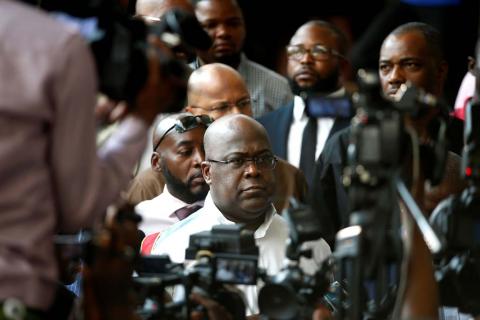Advertisement
Congo heads to the polls for tense, long-delayed presidential vote
KINSHASA - Voters in Democratic Republic of Congo head to the polls on Sunday for a presidential election that could lead to the country's first democratic transfer of power but has been marred by campaign violence and chaotic preparations.
President Joseph Kabila, in power since his father's assassination in 2001, is due to step down after the vote in a milestone for a country plagued by authoritarian rule, coups and civil wars since independence from Belgium in 1960.
Kabila's agreement to stick to constitutional term limits should represent progress for the mineral-rich central African country.
Critics, however, say the vote will be tarnished by fraud, and that Kabila could continue to rule from the sidelines. He has not ruled out running again for president in 2023.
Despite repeated delays to the election, which was originally meant to take place in 2016, diplomats and poll observers say authorities are ill-prepared, raising fears of a repeat of the violence that followed elections in 2006 and 2011.
Security forces killed more than half a dozen opposition supporters on the campaign trail and violent protests erupted this week after authorities announced that three opposition strongholds, accounting for more than 1.2 million out of 40 million voters nationwide, would not be able to vote due to health risks from an ongoing Ebola outbreak and ethnic violence.
Foreign diplomats told Reuters on Friday that only about 60 percent of voting materials across the country were in place, and election observers said polling stations in the capital Kinshasa would struggle to accommodate all voters during voting hours, which run from 6 a.m. (0500 GMT) to 5 p.m.
OPPONENTS FEAR VOTE RIGGING
Opponents of Kabila say the government is trying to tip the election in favor of his preferred successor, former interior minister Emmanuel Ramazani Shadary, whom opinion polls show trailing two opposition candidates.
The most recent poll released by New York University's Congo Research Group on Friday showed former Exxon Mobil manager and opposition lawmaker Martin Fayulu leading the race on 47 percent.
Another opposition leader, Felix Tshisekedi, trailed with 24 percent, while Shadary got 19 percent.
Both Fayulu and Tshisekedi have spoken confidently of victory, but Shadary has big institutional advantages, including round-the-clock coverage on state media. Kabila appointees also dominate national institutions.
"Tomorrow I will be president," Shadary told Reuters on Saturday by phone.
His opponents accuse the ruling coalition of preparing outright vote rigging, with much of their scepticism focused on largely untested electronic voting machines that are being used for the first time.
The national electoral commission (CENI) has tried to reassure the opposition by saying that only print-outs from the machines counted by hand will be factored into the official results.
But any disputed outcome could lead to a wider security breakdown across Congo, particularly along its eastern borders with Rwanda, Uganda and Burundi, where dozens of armed militia are active.
(Additional reporting by Fiston Mahamba and Stanis Bujakera; Writing by Aaron Ross; Editing by Helen Popper)



















Add new comment